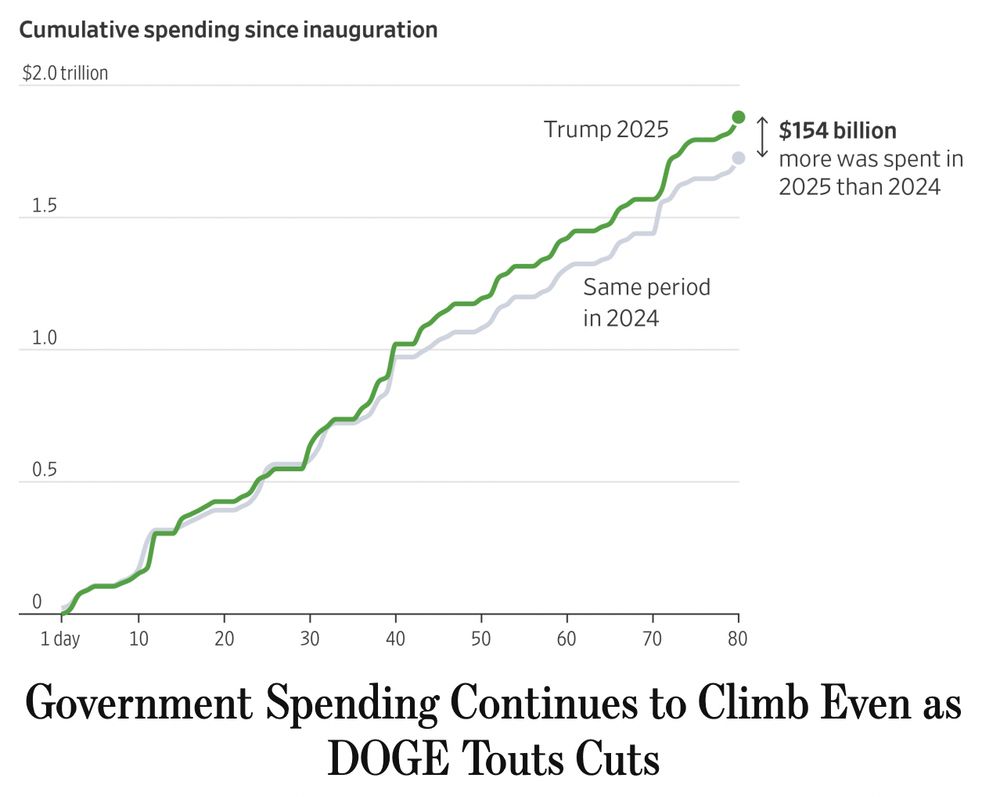
Federal spending is *up* under Trump according to the Wall Street Journal. Chaos is not actually the same as cost savings.
Actual budgeting is a kind of actual policy-making and takes real work spread over real time. Running around breaking stuff isn't that.
www.wsj.com/politics/pol...
11.04.2025 10:43 — 👍 5382 🔁 2102 💬 130 📌 167
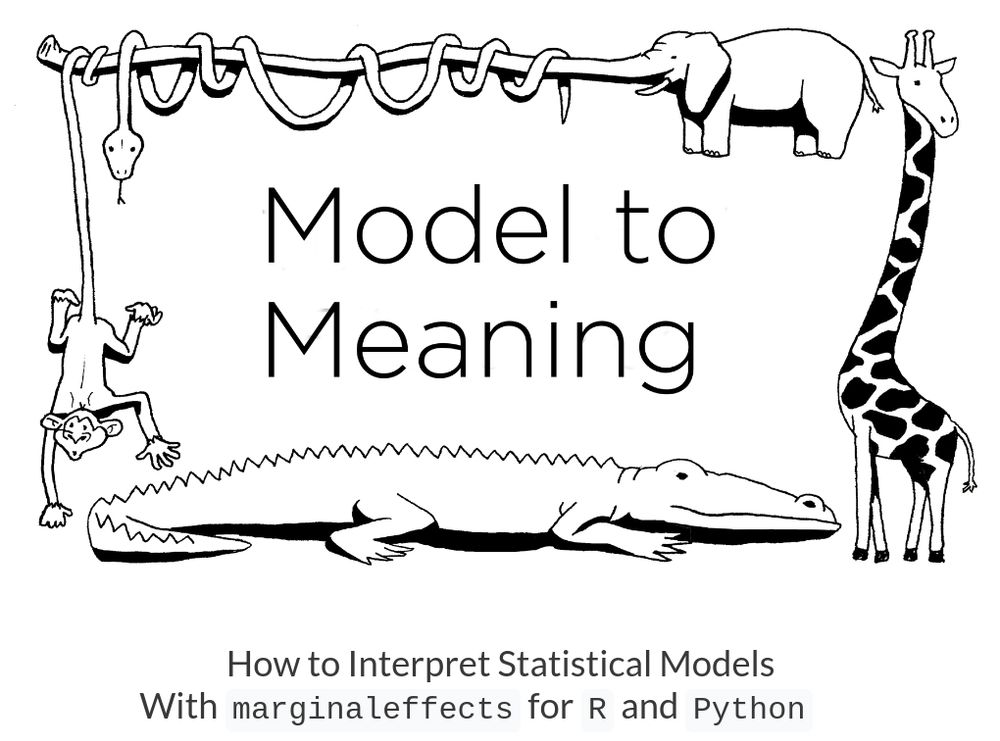
Model to Meaning: How to interpret statistical models with marginaleffects for R and Python
📚😅🎉
Yay!! I just submitted the complete manuscript of my upcoming book to the publisher!
Learn to easily and clearly interpret (almost) any stats model w/ R or Python. Simple ideas, consistent workflow, powerful tools, detailed case studies.
Read it for free @ marginaleffects.com
#RStats #PyData
10.04.2025 19:06 — 👍 599 🔁 149 💬 21 📌 9

‘We are all waiting for a reply.’ Countries say White House hasn’t responded on tariff talks.
The lack of engagement is one signal the White House is still far from reaching substantive trade deals ahead of the midnight deadline for stepped-up global tariffs to kick in.
Authoritarians struggle to make effective policy in part because they have a bottleneck of attention. If no one but the king can make decisions, every decision must wait in line. Meanwhile, things get missed and errors accumulate.
08.04.2025 23:43 — 👍 910 🔁 269 💬 52 📌 15
Thank you Mike! And congrats to Nathan!!!
07.04.2025 21:56 — 👍 1 🔁 0 💬 0 📌 0
This is a fantastic list of papers on properly dealing with control variables (and other related methodological issues) in social science (and #polisky specifically)! I put it all in a public Zotero group library here www.zotero.org/groups/59433...
07.04.2025 19:55 — 👍 129 🔁 27 💬 8 📌 2
Really cool datasets and accompanying papers
The National Elections Database www.nationalelectionsdatabase.com
Paper: academic.oup.com/restud/advan...
Digitally Accountable Public Representation (social media posts of US officeholders 2020-2024)
sites.psu.edu/dapr/
Paper: osf.io/preprints/os...
30.03.2025 17:44 — 👍 56 🔁 11 💬 3 📌 1
NEW: Friends of Neri Alvarado, rotting in a Salvadoran prison on Trump's orders, made a video highlighting his volunteer work helping neurodiverse children learn to swim. Neri was sent there after someone at ICE thought his autism awareness tattoo was a gang tattoo.
Vid posted by Noah Lanard on X.
28.03.2025 19:23 — 👍 3175 🔁 1589 💬 64 📌 122
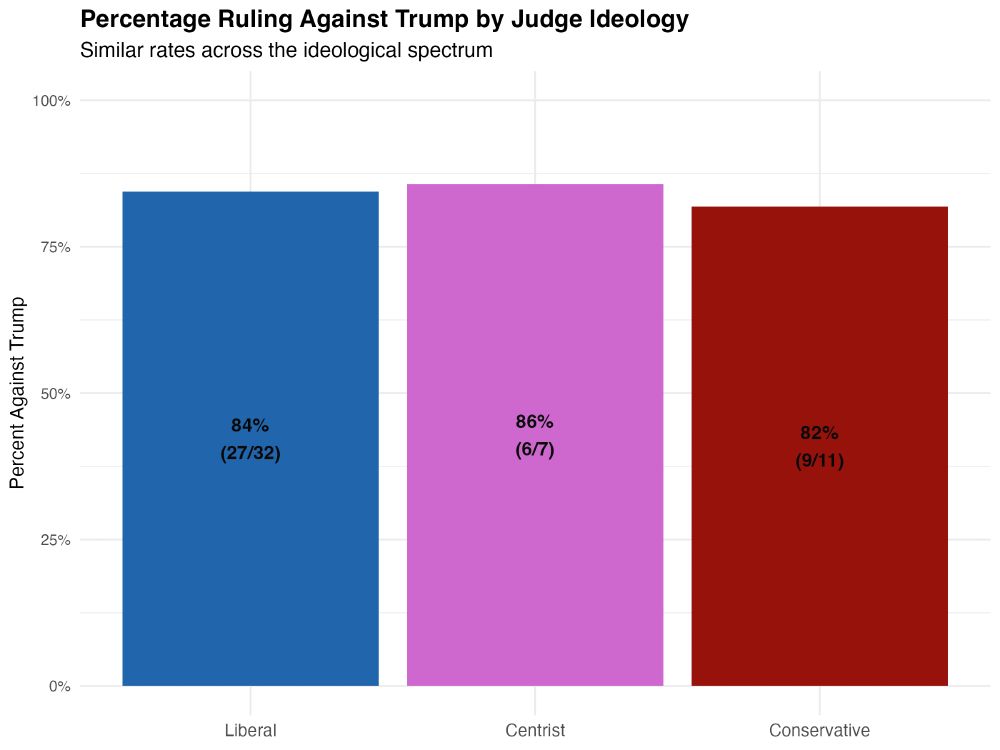
Second Image (Bar Chart)
Title: Percentage Ruling Against Trump by Judge Ideology
Description: A bar chart comparing the percentage of judges ruling against Trump across ideological groups.
• The x-axis categorizes judges as Liberal, Centrist, or Conservative.
• The y-axis represents the percentage of rulings against Trump, ranging from 0% to 100%.
• The three bars show similar rates of ruling against Trump:
• Liberal judges: 84% (27 out of 32)
• Centrist judges: 86% (6 out of 7)
• Conservative judges: 82% (9 out of 11)
• The chart suggests that ruling against Trump is relatively consistent across ideological lines.
2/🧵 Here is the breakdown by ideological groupings. While liberal judges heard more cases (due to geography and venue selection), the consistency of rulings across ideological lines demolishes the narrative that judicial decisions against Trump reflect political bias.
18.03.2025 21:32 — 👍 1236 🔁 291 💬 10 📌 7
Mandatory high school civics class that isn’t just like “how a bill becomes law” or whatever but also “how NOAA powers your phone’s weather app” and “NIH helped make your asthma inhaler”
08.03.2025 12:03 — 👍 4184 🔁 1014 💬 87 📌 70
The average American voter thinks that the government is too big but that it should spend more money on everything it does. This explains a decent share of the political chaos of this country.
02.03.2025 19:48 — 👍 3454 🔁 977 💬 115 📌 79
can't be stressed enough how stuff like this makes policymaking so much more difficult in the future. think you passed a bill appropriating funds over ten years? maybe you did, maybe you didn't!
28.02.2025 16:48 — 👍 98 🔁 23 💬 2 📌 0
I can't speak for others, but I used to be like this. One thing that the 6+ year grind to earn a PhD and develop real expertise on a subject gave me was a respect for others doing the hard work to develop domain-specific expertise.
17.02.2025 17:12 — 👍 11 🔁 2 💬 0 📌 0
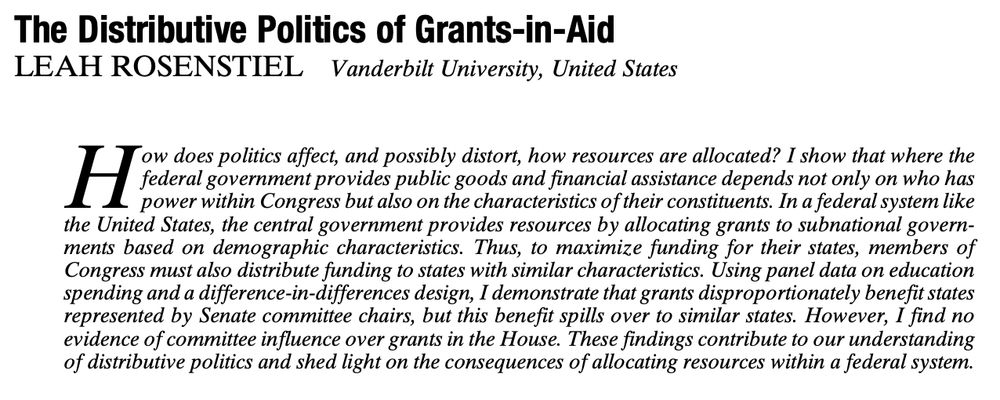
From our new issue: "The Distributive Politics of Grants-in-Aid" by Leah Rosenstiel. #ASPRNewIssue https://www.cambridge.org/core/journals/american-political-science-review/article/distributive-politics-of-grantsinaid/222CF971123CED4D22ACDF2033D37E9A
06.02.2025 16:00 — 👍 5 🔁 3 💬 0 📌 0

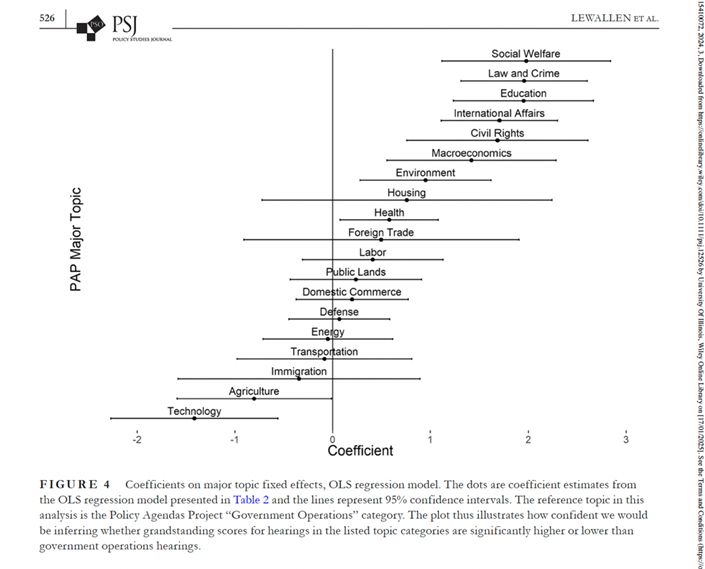
A great @psjeditor.bsky.social paper from Lewallen, Park and @seanmtheriault.bsky.social examines when members of Congress use hearings to grandstand.
They find more grandstanding in solution (legislating) oriented hearings, with variation across topics.
onlinelibrary.wiley.com/doi/abs/10.1...
23.01.2025 17:29 — 👍 8 🔁 6 💬 1 📌 0
CongressData
The CongressData Project aims to compile, disseminate, and encourage the use of data relevant to research of the US Congress and tracks member-level variables across the states across time. We have gathered more than 900 variables from various sources and assembled them into one large, useful dataset. We hope this project will become a 'one-stop shop' for academics, policy analysts, students, and researchers looking for variables germane to the study of the US Congress.
New CongressData update with its r packages & web app:
cspp.ippsr.msu.edu/congress/
We now have 1,000 variables at the district-member-year level, including 9 new data sources with area crosswalks, activist presence, primaries, environmental data, broadband, & legislative style
17.12.2024 17:15 — 👍 28 🔁 13 💬 0 📌 3
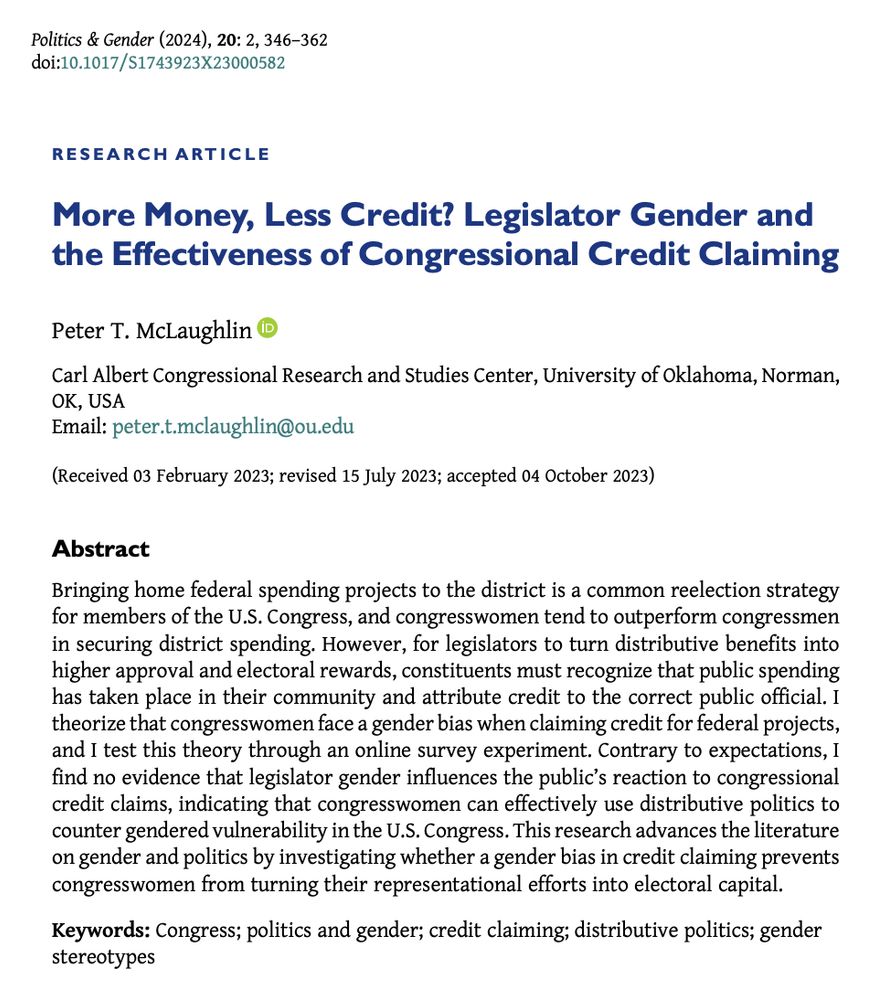
Screenshot of research article entitled "More Money, Less Credit? Legislator Gender and the Effectiveness of Congressional Credit Claiming" by Peter T. McLaughlin
Abstract
Bringing home federal spending projects to the district is a common reelection strategy for members of the U.S. Congress, and congresswomen tend to outperform congressmen in securing district spending. However, for legislators to turn distributive benefits into higher approval and electoral rewards, constituents must recognize that public spending has taken place in their community and attribute credit to the correct public official. I theorize that congresswomen face a gender bias when claiming credit for federal projects, and I test this theory through an online survey experiment. Contrary to expectations, I find no evidence that legislator gender influences the public’s reaction to congressional credit claims, indicating that congresswomen can effectively use distributive politics to counter gendered vulnerability in the U.S. Congress. This research advances the literature on gender and politics by investigating whether a gender bias in credit claiming prevents congresswomen from turning their representational efforts into electoral capital.
🏅In one of our most read articles this week - "More Money, Less Credit?" - @pmclaughlin44.bsky.social utilizes survey experiments to investigate potential gender bias in congressional credit claiming.
Available 🌟 #OpenAccess 🌟
www.cambridge.org/core/journal...
22.11.2024 19:26 — 👍 8 🔁 5 💬 0 📌 0
Asst. Prof, Purdue Political Science. Legislatures, interest groups, parties, and institutional reform. Co-Director, Program on American Institutional Renewal (PAIR).
www.jessemcrosson.com
https://cla.purdue.edu/academic/polsci/research/labs/pair-program/
Assistant Professor at the University of Iowa | congressional elections and text analysis | UNC & UMich alum | colinrcase.com
Research Associate at VCU Research Institute for Social Equity
morganwoodle.com
Research Fellow, Carl Albert Congressional Research & Studies Center
PhD Candidate, University of Oklahoma
Political Scientist. Author of “Political Choice in a Polarized America” @OUP. Dad. Sauna enthusiast. Crossword solver. Powerlifter. Cyclist. ✡️ ∞
Views are mine alone. RT!=endorsement
Book worker, University of Oklahoma Press. Personal account. andrewb@ou.edu
Junior Americanist Workshop Series (JAWS): A new virtual workshop for American politics research in the pandemic age.
Learn about our past and upcoming events here: https://jawspolisci.network/
Professor of Political Science at Stanford | Exploring money in politics, campaigns and elections, ideology, the courts, and inequality | Author of The Judicial Tug of War cup.org/2LEoMrs | https://data4democracy.substack.com
Southmayd Prof @YaleLawSch + Philosophy @Yale. Ed, @LegalTheory + Stanford Encyclopedia of Phil. “Legality”, “The Internationalists” (with @oonahathaway), “Fancy Bear Goes Phishing.” Overuses “neurosymbolic.”
On here way too much. Political scientist at Georgia State University. Congress & elections. My feed is mostly politics but you’ll get some sports takes and terrible dad jokes along the way.
Political scientist, ASU and Wash U. Congress, elections, public opinion, survey research. Husband, dad, granddad. RT ≠ endorsement. Personal views. https://stevesnotes.substack.com https://sites.wustl.edu/smith/
Political Scientist/Assistant Professor, Claremont Graduate University | 2019-20 APSA Congressional Fellow | Optimistic @WSUcougars & @Mariners fan | https://calgara.github.io
Assistant Professor of Environmental Policy @mtu_socialsci | Alumni @CUDenverSpa | Policy 📚 | Environment 🌿 | Rural Culture 🌾 | Democracy 📜 | Emotions ❤️ | i’m high key
Dartmouth political scientist and Bright Line Watch co-director. Previously Upshot NYT / CJR contributor, Spinsanity co-founder, All the President's Spin co-author.
https://sites.dartmouth.edu/nyhan/
http://brightlinewatch.org
Associate Professor of Political Science, University of Illinois Chicago. Author of The Thinkers: The Rise of Partisan Think Tanks and the Polarization of American Politics. Also, baseball.
Full Prof, political science, UCLouvain | Chair of MethodsNET @methodsnet.bsky.social, global hub for #researchmethods #innovation & accessible #training | Into #QCA, comparison, #mixedmethods, multidata & cool collaborative projects | #methods pluralist
Auditing the challenges of democracy in the 21st century for the Danish parliament with a particular focus on social media, mistrust and political alienation.
Political science professor at Aarhus University, Denmark.
Assistant professor at Georgia State University, formerly at BYU. 6 kids. Study NGOs, human rights, #PublicPolicy, #Nonprofits, #Dataviz, #CausalInference.
#rstats forever.
andrewheiss.com
Signal: andrewheiss.01








